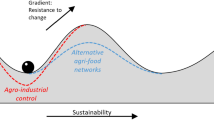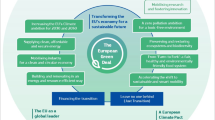Abstract
This article examines the development of and contestation over the standards for certified fair trade, with particular attention to the U.S. context. It charts fair trade’s rapid growth in the United States since the 1999 advent of formal certification, explores the controversies generated by the strategy of market mainstreaming in the sector, and focuses on five key issues that have generated particularly heated contention within the U.S. fair trade movement. It offers a theoretical framework based in the literatures on agrifood systems, social movements, and public-choice economics, for understanding the corporate response to alternative markets such as fair trade. The article suggests a typology of responses by social movement actors to this increased corporate participation, and assesses the relevance of the U.S. case for the future prospects of fair trade, both in other national contexts and as an international movement.
Similar content being viewed by others
References
Agricultural Justice Project. (2007). New Pilot Food Label Certifies Social and Environmental Stewardship (Press Release). Minneapolis, MN: Agricultural Justice Project.
Agricultural Justice Project (2008). Social Stewardship Standards in Organic and Sustainable Agriculture: Full Standards Document. Minneapolis, MN: Agricultural Justice Project.
Allen, P. and M. Kovach. (2000). “The capitalist composition of organic: the potential of markets in fulfilling the promise of sustainable agriculture.” Agriculture and Human Values 17(3): 221-232.
Bacon, C. (2009). Who Decides What is Fair in Fair Trade? An Action Research Approach to Connect Agro-Environmental Governance with Livelihood Vulnerabilities in the Americas. Paper Presented at American Association of Geographers Meeting, Las Vegas, NV, March 22–27, 2009.
Bacon, C., CAFENICA and C. Coordinadora Latinoamericana y del Caribe de Pequenos Productores de Comercio Justo: 2006, Estudio de Costos y Propuesta de Precios para Sostener el Café, las Familias Productores y Organizaciones Certificadas por Comercio Justo en America Latina y el Caribe: Coordinadora Latinoamericana y del Caribe de Pequeños Productores de Comercio Justo, CLAC.
Bahra, P.: 2009, ‘Tea Workers Still Waiting to Reap Fairtrade Benefits’, The Times (UK). Retrieved January 8, 2009, from http://www.timesonline.co.uk/tol/news/uk/article5429888.ece.
Barrientos, S., Michael E. Conroy and Elaine Jones. (2007). Northern Social Movements and Fair Trade. In: Fair Trade: The Challenges of Confronting Globalization. L. T. Raynolds, D. Murray and J. Wilkinson, (ed) New York, Routledge 51-62.
Busch, L. and C. Bain. (2004). “New! Improved? The Transformation of the Global Agrifood System.” Rural Sociology 69(3): 321-346.
Campbell, D. (2001). “Conviction seeking efficacy: Sustainable agriculture and the politics of co-optation.” Agriculture and Human Values 18(4): 353-363.
Dobson, C.: n.d., Social Movements: A Summary of What Works. Retrieved July 28, 2008, from http://www.vcn.bc.ca/citizens-handbook/movements.pdf.
Doherty, B. and S. Tranchell. (2005). “New Thinking in International Trade? A Case Study of The Day Chocolate Company.” Sustainable Development 13(3): 166-176.
Doherty, B. and S. Tranchell. (2007). ““Radical Mainstreaming” of Fairtrade: the Case of The Day Chocolate Company.” Equal Opportunities International 26(7): 693.
DuPuis, M. and S. Gillon: 2009, ‘Alternative Modes of Governance: Organic as Civic Engagement’, Agriculture and Human Values, 26, 43–56.
Equal Exchange: 2005, Fair Trade Coffee Pioneer Questions Nestle Entry into Market: Equal Exchange Cites Multinational’s ‘Credibility Gap. West Bridgewater, MA.
Equal Exchange: 2009, Equal Exchange Joins Critique of Fair Trade Plantations: Tea Estate Workers Voice Skepticism over Ethical Claims. Retrieved March 3, 2009, from http://www.equalexchange.coop/equal-exchange-joins-critique-of-fair-trade-plantations.
FLO: 2008, Annual Report 2007: An Inspiration for Change (Fairtrade Labelling Organizations International, Bonn, Germany).
Fridell, G. (2007). Fair Trade Coffee: The Prospects and Pitfalls of Market-Driven Social Justice. Toronto: University of Toronto Press.
Fridell, M., I. Hudson and M. Hudson (2008). “With Friends Like These: The Corporate Response to Fair Trade.” Review of Radical Political Economy 40(1): 8-34.
Gamson, H. (1968). Power and Discontent. Homewood, IL: Dorsey Press.
Gamson, H. (1975). The Strategy of Social Protest. Homewood, IL: Dorsey Press.
Gereffi, G., J. Humphrey and J. Sturgeon. (2005). “The Governance of Global Value Chains.” Review of International Political Economy 12: 78-104.
Gereffi, G. and M. Korzeniewicz, Eds. (1994). Commodity Chains and Global Capitalism. Westport, CT and London: Praeger.
Green LA Girl: 2006, Certification Challenges XIII: 5% – Requirement vs. Recommendation. Retrieved March 3, 2009, from www.greenlagirl.com/2006/03/24/certification-challenges-xiii-5-requirement-vs-recommendation.
Green LA Girl: 2008, Why Dean’s Beans Got Fair Trade Certified – Again. Retrieved February 21, 2009, from http://greenlagirl.com/2008/01/15/why-deans-beans-got-fair-trade-certified-again/.
Global Exchange: 2007, 100% Fair Trade Companies. Retrieved July 29, 2008, from http://www.globalexchange.org/campaigns/fairtrade/coffee/retailers.html.
Goigoi, P.: 2008a, ‘Is Fair Trade Becoming “Fair Trade Lite”?’, Business Week, June 18.
Goigoi, P.: 2008b, ‘A Wal-Mart PR Issue Brews Anew’, Business Week, April 1.
Goodman, D. and M. Goodman: 2007, ‘Localism, Livelihoods and the ‘Post-Organic’: Changing Perspectives on Alternative Food Networks in the United States, in D. Maye, L. Holloway and M. Kneafsey (Eds.), Alternative Food Geographies: Representation and Practice (Elsevier Science, Oxford, UK), pp. 23–38.
Guthman, J. (2004a). Agrarian Dreams: The Paradox of Organic Farming in California. Berkeley, California: University of California Press.
Guthman, J. (2004b). “The Trouble with ‘Organic Lite’ in California: a Rejoinder to the ‘Conventionalisation’ Debate.” Sociologia Ruralis 44(3): 301-316.
Holt-Gimenez, E., I. Bailey and D. Sampson (2007). Fair to the Last Drop: The Corporate Challenges to Fair Trade Coffee. Oakland, CA: Food First.
Jaffee, D (2007). Brewing Justice: Fair Trade Coffee, Sustainability, and Survival. Berkeley, California: University of California Press.
Jaffee, D. and P. Howard: 2010, ‘Corporate Cooptation of Organic and Fair Trade Standards’, Agriculture and Human Values 27(4).
Jaffee, D., J. R. Kloppenburg and M. B. Monroy. (2004). “Bringing the “Moral charge” home: Fair trade within the north and within the south.” Rural Sociology 69(2): 169-196.
Just Coffee: 2007, FLO Announces a Raise. Retrieved March 2, 2009, from http://justcoffee.coop/node/1059.
Laffont, J.-J. and J. Tirole: 1991, ‘The Politics of Government Decision-Making: A Theory of Regulatory Capture’, Quarterly Journal of Economics 106, 1089–1127.
Mutersbaugh, T. (2005a). “Fighting standards with standards: Harmonization, rents, and social accountability in certified agrofood networks.” Environment and Planning A 37(11): 2033-2051.
Mutersbaugh, T. (2005b). “Just-in-space: Certified rural products, labor of quality, and regulatory spaces.” Journal of Rural Studies 21(4): 389-402.
North, R.: 2008. On Fair Trade “Fig Leaves”: Equal Exchange Speaks out on Abuse of the Fair Trade system. Retrieved February 28, 2009, from http://www.wedge.coop/newsletter/article/630.html.
Organic Consumers Association: 2008, ‘Tell Starbucks We Want Fair Trade, Not Greenwashing’, Organic Bytes. Retrieved July 30, 2008, from http://www.organicconsumers.org/bytes/ob139.cfm.
Patriana, Z.: 2008, ‘Leading Fair Trade Roaster Critiques Starbucks’ Decision’, Change.org Fair Trade Blog. Retrieved March 31, 2009, from http://fairtrade.change.org/blog/view/leading_fair_trade_coffee_roaster_critiques_recent_starbucks_decision.
Raynolds, L. T.: 2007, ‘Fair Trade Bananas: Broadening the Movement and Market in the United States’, in L. T. Raynolds, D. Murray and J. Wilkinson (Eds.), Fair Trade: The Challenges of Confronting Globalization (Routledge, New York).
Raynolds, L. T. (2009). “Mainstreaming Fair Trade Coffee: From Partnership to Traceability.” World Development 37(6): 1083–1093.
Raynolds, L. T., D. Murray and A. Heller. (2007). “Regulating Sustainability in the Coffee Sector: A Comparative Analysis of Third-Party Environmental and Social Certification Initiatives.” Agriculture and Human Values 24: 147-163.
Raynolds, L. T., D. Murray and J. Wilkinson, Eds. (2007). Fair Trade: The Challenges of Transforming Globalization. New York: Routledge.
Raynolds, L. T. and J. Wilkinson. (2007). Fair Trade in the Agriculture and Food Sector: Analytical Dimensions. in Fair Trade: The Challenges of Transforming Globalization. L. T. Raynolds, D. Murray and J. Wilkinson, Ed. New York: Routledge.
Reed, D.: 2009, ‘What do Corporations have to do with Fair Trade? Positive and Normative Analysis from a Value Chain Perspective’, Journal of Business Ethics 86, 3–26.
Renard, M.C. (2005a). “Quality Certification, Regulation and Power in Fair Trade.” Journal of Rural Studies 21(4): 419-431.
Renard, M. C.: 2006, Recomposición de la Gobernancia en el Comercio Justo. Paper Presented at Coloquio ALTER 2006, Baeza, Jaén, Spain, October 18–21, 2006.
Renard, M. C. and V. Perezgrovas: 2007, ‘Fair Trade Coffee in Mexico: At the Center of the Debates, in L. T. Raynolds, D. Murray and J. Wilkinson (Eds.), Fair Trade: The Challenges of Transforming Globalization (Routledge, New York), pp. 138–156.
Rogers, T.: 2004, ‘Small Coffee Brewers Try to Redefine Fair Trade’, Christian Science Monitor, April 13.
Selznick, P. (1949). TVA and the Grass Roots. New York: Harper.
Stigler, G. (1971). “The Theory of Economic Regulation.” Bell Journal of Economics and Management Science 2: 3-21.
The Packer: 2009, ‘Dole Debuts Fair Trade Pineapples, Bananas’, The Packer. Retrieved October 24, 2009, from http://thepacker.com/Dole-debuts-Fair-Trade-pineapples–bananas/Article.aspx?articleid=843790&feedid=217.
Thompson, C. J. and G. Coskuner-Balli. (2007). “Countervailing Market Responses to Corporate Co-optation and the Ideological Recruitment of Consumption Communities.” Journal of Consumer Research 34: 135-152.
Transfair USA: 2007, Press Release: FLO International Raises Fairtrade Price for Coffee Farmers (Transfair USA, Oakland, CA).
Transfair USA: 2008a, Board Members. Retrieved March 2, 2009, from http://www.transfairusa.org/content/about/board.php.
Transfair USA: 2008b, Fair Trade Products. Retrieved January 11, 2009, from http://transfairusa.org/content/about/products.php.
Transfair USA: 2008c, Frequently Asked Questions – Advanced. Retrieved May 23, 2008, from http://transfairusa.org/content/resources/faq-advanced.php.
Transfair USA: 2008d, One Billion Ways to Be Fair: U.S. Fair Trade Certified Product Sales Surpass $1 Billion. Retrieved February 20, 2009, from http://transfairusa.org/content/about/pr/pr_080903.php.
Transfair USA: 2008e, Starbucks, TransFair USA and Fairtrade Labelling Organizations International Announce Groundbreaking Initiative to Support Small-Scale Coffee Farmers. Retrieved January 11, 2009, from http://www.transfairusa.org/content/about/news/n_081028.php.
Transfair USA. (2008f). Transfair USA–2007 Annual Report. Oakland, CA: Transfair USA.
Transfair USA: 2008g, TransFair USA Corporate Engagement Guidelines. Retrieved May 12, 2009, from http://www.transfairusa.org/content/Downloads/resources/TFUSA_Engagement_Guidelines.pdf.
Transfair USA. (2009). Almanac: 2008. Oakland, CA: Transfair USA.
Transfair USA and Starbucks Coffee: 2009, Starbucks, TransFair USA and Fairtrade Labelling Organizations International Join in Support of Small-Scale Coffee Farmers Through a $20 Million Loan Program. Retrieved May 1, 2009, from http://www.transfairusa.org/content/about/pr/pr_090416c.php.
Tucker, A.: 2006, ‘Fair Enough?’, New Internationalist 395(November), 7.
Wilkinson, J. and G. Mascarenhas: 2007, ‘Southern Social Movements and Fair Trade’, in L. T. Raynolds, D. Murray and J. Wilkinson (Eds.), Fair Trade: The Challenges of Confronting Globalization (Routledge, New York).
Workers Independent News: 2005, ‘NLRB Rules in Favor of Starbucks Union’, Workers Independent News. Retrieved December 30, 2005, from www.laborradio.org/node/391.
Author information
Authors and Affiliations
Corresponding author
Rights and permissions
About this article
Cite this article
Jaffee, D. Fair Trade Standards, Corporate Participation, and Social Movement Responses in the United States. J Bus Ethics 92 (Suppl 2), 267–285 (2010). https://doi.org/10.1007/s10551-010-0583-1
Published:
Issue Date:
DOI: https://doi.org/10.1007/s10551-010-0583-1




